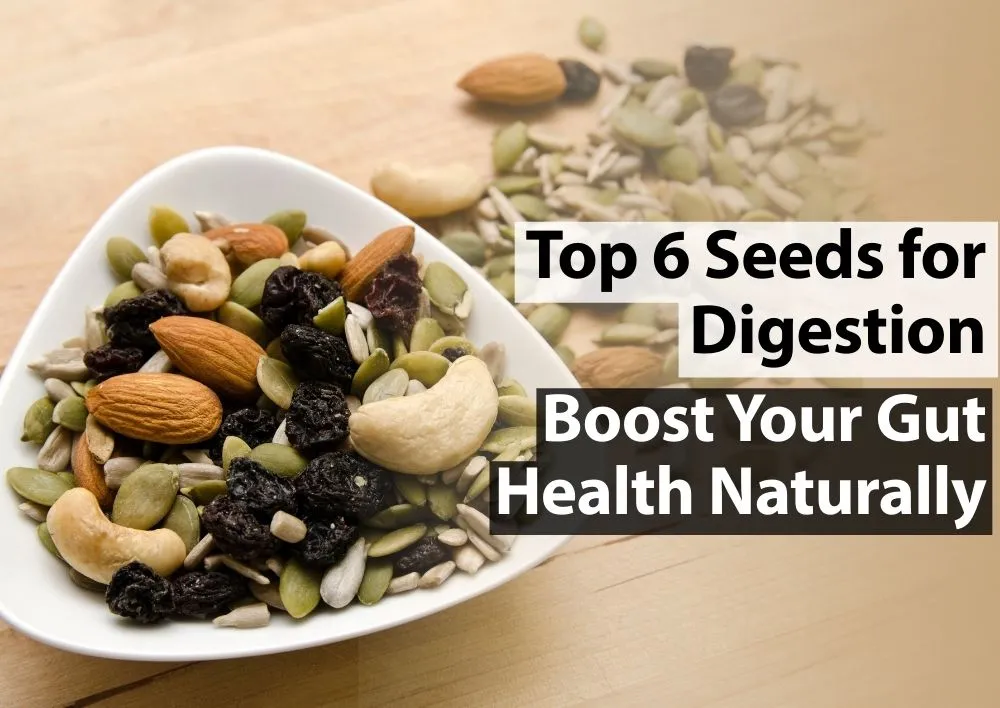Top 6 Seeds for Digestion: Boost Your Gut Health Naturally
Summary
A happy gut is the secret to a healthy body! Good digestion doesn’t just help you absorb nutrients; it boosts immunity, lifts your mood, and keeps you feeling energetic every day. While eating well, staying hydrated, and exercising are essential, did you know that tiny seeds can work wonders for your digestive health? Packed with fiber, antioxidants, and necessary nutrients, these little powerhouses can keep your bowel movements smooth, reduce bloating, and give your gut the care it deserves. In this blog, we will explore the top 6 seeds for digestion and how including them in your diet can transform your gut health.
1. Flaxseeds (Alsi)
Flaxseeds are a powerhouse of dietary fiber and omega-3 fatty acids, making them perfect for digestion. The high fiber content in flaxseeds adds bulk to stool, promoting regular bowel movements and preventing constipation.
Benefits for digestion:
-
Rich in soluble and insoluble fiber, helping in smooth digestion.
-
Helps reduce bloating and inflammation in the gut.
-
Supports the growth of healthy gut bacteria because of prebiotic effects.
"Flaxseeds are one of the simplest yet most effective additions to your diet for better digestive health. Just a tablespoon daily can help regulate bowel movements and support a healthy gut microbiome," says Dr. Deepanshu Khanna, one of the renowned Gastroenterologists in Gurgaon at Miracles Mediclinic.
How to use:
Grind flaxseeds and add them to your smoothies, oatmeal, or yogurt. You can also sprinkle them over salads or mix them into baked goods.
2. Chia Seeds
Chia seeds are small seeds with alot of digestive benefits. They absorb water and form a gel-like substance, which helps soften stool and promotes regular bowel movements.
Benefits for digestion:
-
Prevents constipation and maintains bowel regularity.
-
Provides prebiotic fiber that nourishes gut bacteria.
-
Reduces acid reflux and soothes the stomach lining.
How to use:
Soak chia seeds in water, milk, or juice for at least 20 minutes before consuming. Add them to smoothies, puddings, or breakfast bowls for a digestive boost.
3. Fennel Seeds (Saunf)
Fennel seeds are known for their digestive properties. They contain compounds like anethole, which relaxes the digestive tract muscles and helps relieve bloating, gas, and indigestion.
Benefits for digestion:
-
Reduces bloating, gas, and stomach cramps.
-
Stimulates digestive enzymes and bile production.
-
Acts as a natural remedy for heartburn.
How to use:
Chew a teaspoon of fennel seeds after meals or brew them as a tea to aid digestion. Fennel tea is also great for calming an upset stomach.
4. Pumpkin Seeds (Pethe ke Beej)
Pumpkin seeds are not only rich in nutrients but also excellent for gut health. They are high in fiber and healthy fats, which improve digestion and nutrient absorption.
Benefits for digestion:
-
Promotes smooth bowel movements.
-
Reduces bloating and abdominal discomfort.
-
Supports a healthy gut microbiome with prebiotic fiber.
How to use:
Roast pumpkin seeds lightly and consume as a snack, or add them to cereals, smoothies, and salads.
5. Sesame Seeds (Til)
Sesame seeds are small yet packed with nutrients that benefit digestive health. They are an excellent source of both soluble and insoluble fiber.
Benefits for digestion:
-
Improves bowel regularity and prevents constipation.
-
Helps maintain a healthy balance of gut bacteria.
-
Reduces stomach inflammation and supports overall gut health.
How to use:
Sprinkle sesame seeds on salads, smoothies, or yogurt. You can also use sesame seed paste in dressings or spreads for a digestive boost.
6. Sunflower Seeds
Sunflower seeds are rich in fiber, healthy fats, and essential vitamins like vitamin E, which help in smooth digestion and reduce digestive discomfort.
Benefits for digestion:
-
Promotes regular bowel movements.
-
Supports gut health by feeding beneficial bacteria.
-
Helps reduce inflammation in the digestive tract.
How to use:
Snack on roasted sunflower seeds or add them to cereals, salads, or homemade granola.
Tips to Maximize Digestive Benefits from Seeds
-
Stay Hydrated: Fiber-rich seeds need water to work effectively. Drink plenty of fluids throughout the day.
-
Moderation is Key: Overconsumption may cause bloating or gas. Stick to recommended portions: 1–2 tablespoons per day.
-
Combine with a Balanced Diet: Pair seeds with fruits, vegetables, and whole grains for optimal gut health.
-
Chew or Soak Seeds: Soaking or grinding seeds improves nutrient absorption and eases digestion.
Conclusion:
Incorporating these top seeds for digestion into your daily routine can significantly improve gut health, reduce digestive issues, and enhance overall well-being. These natural, nutrient-dense seeds are easy to include in your meals and snacks, making digestion-friendly eating simple and effective. Start today by sprinkling these seeds over your meals, adding them to smoothies, or brewing a warm digestive tea.
Looking for personalized guidance on improving digestion? Consult with one of the best gastroenterologists near you today for the best treatment plan tailored to your gut health.
Frequently Asked Questions
Flaxseeds are the best for gut health because of their high fiber content and omega-3 fatty acids, which support digestion and promote healthy gut bacteria.
Yogurt, kefir, kimchi, oats, and bananas are excellent for gut health as they contain probiotics, fiber, and nutrients that support digestion.
Flaxseeds, chia seeds, pumpkin seeds, sunflower seeds, sesame seeds, hemp seeds, fennel seeds, coriander seeds, cumin seeds, and mustard seeds.
Fennel seeds, flaxseeds, chia seeds, and cumin seeds can help cleanse the stomach and improve digestion naturally.
A super seed is a nutrient-dense seed packed with vitamins, minerals, fiber, and healthy fats that offer significant health benefits.
Miracles Healthcare in Gurgaon is a top choice for digestive health, offering expert gastroenterologists and advanced diagnostic and treatment facilities.















Was the information useful?
5 0